On 17 October 2015, French actress and film producer Danièle Delorme passed away. Delorme acted in more than seventy films and television productions since 1942. She is probably best remembered for her starring roles in the original French production of Gigi (1948) and Minne (1950), both based on novels by Colette. In the 1970s she played the female lead in the hit comedy Un éléphant ça trompe énormément/An Elephant Can Be Extremely Deceptive (1976). She also co-produced several films directed by her husband, Yves Robert, and other directors. Danièle Delorme was 89.
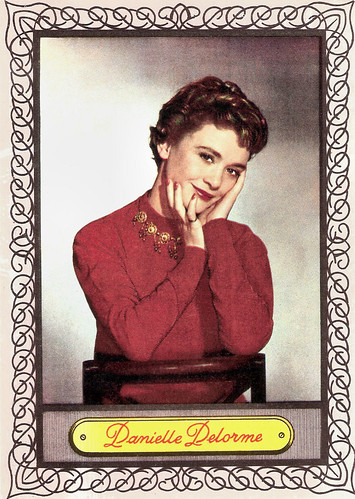
French postcard by SO ME FAB, Marseilles / Imp. De Marchi. Photo: Sam Lévin.
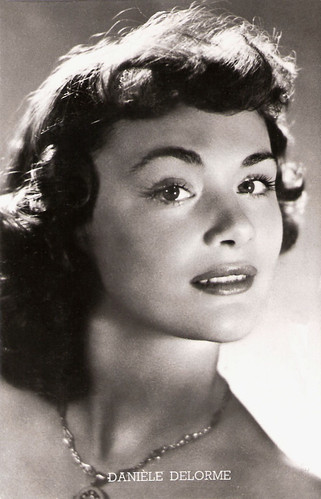
French postcard, no. 153.
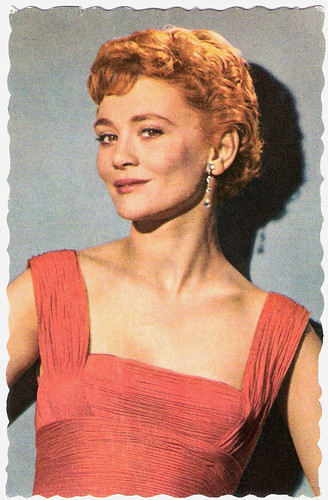
French postcard by Imp. De Marchi Frères, Marseille.
Danièle Delorme was born Gabrielle Danièle Marguerite Andrée Girard in 1926 in Levallois-Perret, France. Her parents were the painter and poster designer André Girard and his wife. Danièle aspired to a musical career and studied to be a concert pianist, but the war and the French occupation by the Nazis interfered. She fled to Cannes, where she got acting classes from Jean Wall.
In 1942, she made her first stage appearances with the company of Claude Dauphin. She also made her film debut opposite Dauphin in La belle aventure/Twilight (Marc Allégret, 1942) using her birth name, Danièle Girard. The film was banned in 1943 by the German Occupation authorities because Dauphin had by then joined the F.F.L. (French Liberation Forces).
For her next film, Les petites du quai aux fleurs/The Girls of the Quai aux Fleurs (Marc Allégret, 1944) Girard adopted the stage name Delorme. After the liberation, she finished her studies in Paris with lessons by René Simon and Tania Balachova. She played opposite Michel Auclair in Alain Resnais's early film, Ouvert pour cause d'inventaire/Open for Inventory Causes (Alain Resnais, 1946). Sadly no copies of this film exist anymore.
The following year she played a small part in Les jeux sont faits/Second Chance (Jean Delannoy, 1947) starring Micheline Presle and based on an original scenario by Jean-Paul Sartre. She also appeared in a supporting part in Maurice Tourneur’s last film, Impasse des Deux Anges/Dilemma of Two Angels (Maurice Tourneur, 1948) starring Paul Meurisse and Simone Signoret.
Then Delorme had her breakthrough in the title role of the original French production of Gigi (Jacqueline Audry, 1949), a decade before Leslie Caron starred in the famous 1958 Hollywood adaptation of Colette’s classic novel directed by Vincente Minelli. Reviewer Bensonj at IMDb writes: “This delightful film succeeds because of the talents of all who contributed to it, but mostly because of the fresh, light performance of Daniele Delorme in a role that could have been so much less. The young girl's mother and aunt expend extraordinary efforts to develop her into a high-class mistress (without letting her in on the plan). This sordid idea is handled with a sure, light touch, succeeding because of the direction, writing and performances, especially that of Delorme, who is sweet but not too sweet, innocent but not too innocent, and above all bright, fresh and unaffected.”
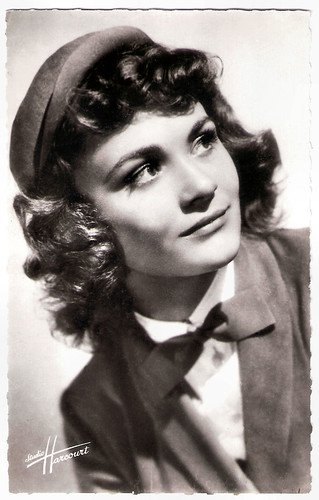
French postcard by Editions du Globe, Paris, no. 108. Photo: Studio Harcourt.
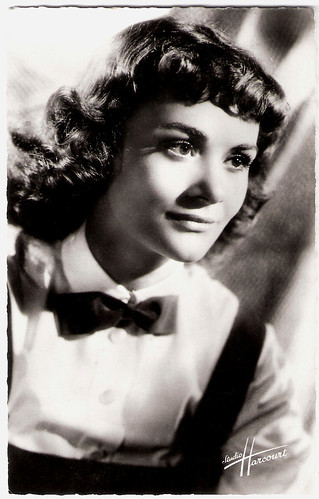
French postcard by Editions du Globe, Paris, no. 211. Photo: Studio Harcourt.
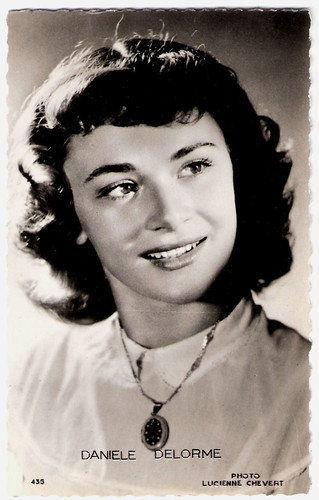
French postcard by Editions P.I., Paris, no. 435. Offert par les Carbones Korès. Photo: Lucienne Chevert.
Danièle Delorme starred opposite Louis Jouvet and Bourvil in the title role of famous French suspense director Henri-George Clouzot’s only comedy Miquette et sa mère/Miquette (Henri-Georges Clouzot, 1950). The result was disappointing. DBduMonteil at IMDb writes: “There's nothing from his magic touch here. Reigning supreme over French suspense movies (Le corbeau, Les diaboliques, Le salaire de la peur), his art becomes ineffective when it comes to bittersweet albeit bland comedies like this one. The good cast (Louis ‘Quai des orfèvres’ Jouvet, Bourvil and Danielle Delorme does not make up for this trite story of an ingénue and these light-hearted gallantries. Probably the only Clouzot movie which is not worth watching”.
More successful was Minne, l'ingénue libertine/Minne (1950), again based on a Colette novel and directed by Jacqueline Audry, the first female director of the French sound cinema. Franck Villard was again Delorme’s leading man. Among her next films is the experiment Traité de bave et d'éternité/Venom and Eternity (1951) in which Isidore Isou, the leader of the lettrist movement, lashes out at the conventional cinema and offers a revolutionary form of film-making: through scratching and bleaching the film, through desynchronizing the soundtrack and the visual track, through deconstructing the story, he aims to renew the cinema the same way he tried to revolutionize the literary world.
Délorme’s cooperation with Jacqueline Audrey and Colette continued with Olivia/The Pit of Loneliness (Jacqueline Audry, 1953), which captures the awakening passions of an English adolescent (Marie-Claire Olivia) for her headmistress (Edwige Feuillère) at a small finishing school outside Paris. Délorme played an older student.
She was also one of the many stars who appeared in Si Versailles m’était conté/Affairs in Versailles (Sacha Guitry, 1954), a history of the Versailles palace from its founding by Louis XIII to the present. In Italy, she played the wife of Marcello Mastroianni in an episode of the anthology film Tempi nostri/A Slice of Life (Alessandro Blasetti, Paul Paviot, 1954) and in the biopic Casa Ricordi/House of Ricordi (Carmine Gallone, 1954) about Giovanni Ricordi, who in 1807 made a deal with the Teatro La Scala in Milan to print all their music sheets, in exchange for the handwritten works of all the composers hired by the Scala.
Other films in which she starred were the drama Le dossier noir/Black Dossier (André Cayatte, 1955), the thriller Voici le temps des assassins.../Deadlier Than the Male (Julien Duvivier, 1956) as a femme fatale opposite Jean Gabin, and as Fantine in Les misérables (Jean-Paul Le Chanois, 1958). In between there was another cooperation with Jacqueline Audry and Colette: Mistou ou Comment l'esprit vient aux filles... (Jacqueline Audry, 1956) in which she starred as a kept girl who lives in a desirable apartment which looks out onto the Eiffel Tower during the First World War. Besides her cinema appearances, she also often worked in the theatre in plays by Jean Anouilh, Marcel Achard and Eugène Ionesco.
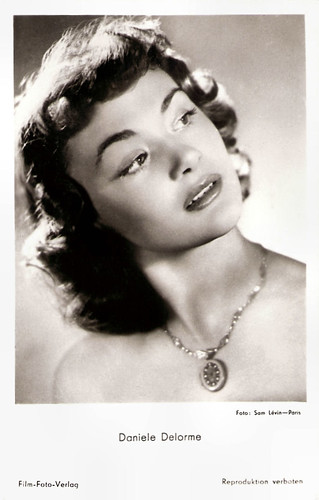
German postcard by Ufa Film-Foto-Verlag, Berlin-Tempelhof, no. FK 505. Photo: Sam Lévin, Paris.
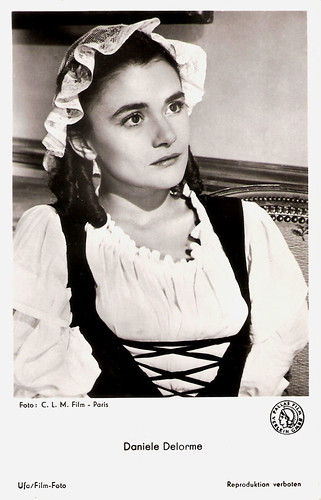
German postcard by Ufa, Berlin-Tempelhof, no. FK 954. Photo: C.L.M. Film, Paris / Pallas Film Verleih. Publicity still for Si Versailles m'était conté.../Fabulous Versailles (Sacha Guitry, 1954).
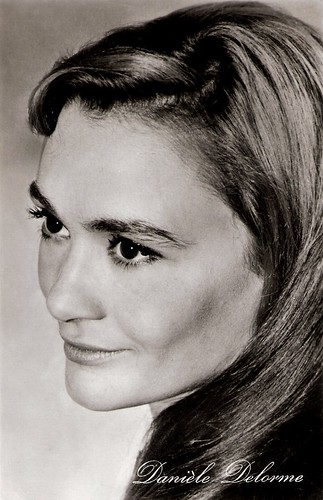
East-German postcard by VEB Progress Filmvertrieb, Berlin, no. 147/673, 1958. Photo: Defa. Publicity still for Les misérables (Jean-Paul Le Chanois, 1958).
In the early 1960s, Daniële Delorme worked a few times with some of the young directors of the Nouvelle Vague. She appeared with Anna Karina and Jean-Luc Godard in Agnès Varda’s short comedy Les fiancés du pont Mac Donald ou (Méfiez-vous des lunettes noires)/The Lovers of the Pont mac Donald (Beware of Dark Sunglasses) (Agnès Varda, 1961) and appeared again for Varda’s camera in the classic Cléo de 5 à 7/Cleo From 5 To 7 (Agnès Varda, 1962) featuring Corinne Marchand.
She also played in other interesting films such as the crime film Le septième juré/The Seventh Juror (Georges Lautner, 1964) with Bernard Blier, Le voyou/The Crook (Claude Lelouch, 1970) featuring Jean-Louis Trintignant, and Belle (André Delvaux, 1974) opposite Jean-Luc Bideau.
Although she continued to play leading parts, her appearances in the cinema had become rarer but her film career got a boost with the hit comedy Un éléphant ça trompe énormément/An Elephant Can Be Extremely Deceptive (Yves Robert, 1976) in which she played the wife of Jean Rochefort.
IMDb reviewer David Vanholsbeeck commented: “Whereas the story may not be very original, this film is extremely charming and amiable nonetheless. It has a great supporting cast ((Claude) Brasseur is a stand-out), very funny moments and many real-life characters. Too bad this charming little film was later remade as The Woman in Red (with Gene Wilder and Kelly LeBrock). But Hollywood seems to have this ‘urge’ to make their own version of each film with a bit of success outside the States. Anyway, if you have to choose between the original and the remake, choose Un éléphant...(or Pardon mon affaire as it is sometimes called).”
A year later the sequel Nous irons tous au paradis/Pardon Mon Affaire, Too! (Yves Robert, 1977) with the same cast was also a hit. At IMDb, Bob Taylor reviews: “Daniele Delorme, who was married to Yves Robert, is the real treasure in this picture. Her career as an actress spanned three decades of steady work before she started a production company with her husband. Here she is a wonderful foil for Rochefort in their tense domestic scenes together; she's calm while he's agitated.”
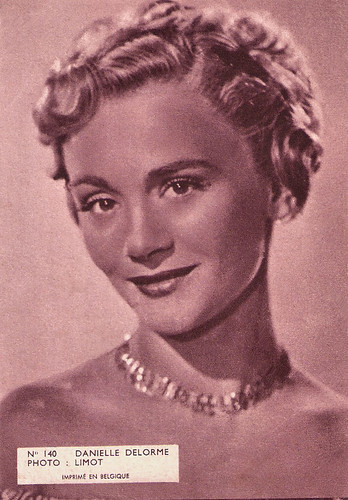
Belgian collectors card by Cinema Novy, Nevele, no. 140. Photo: Limot.
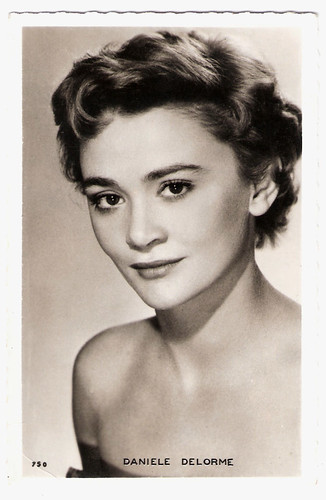
French postcard by Editions P.I., Paris, no. 750. Photo: Sam Lévin.
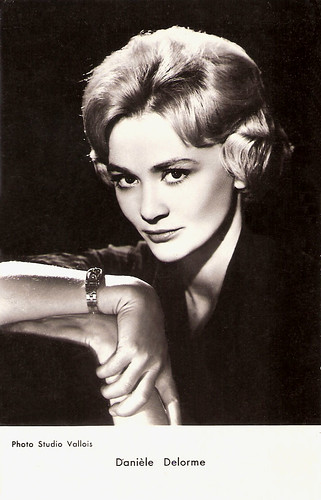
French postcard by Editions P.I., Paris, no. 971. Photo: Studio Vallois.
Since 1956, Danièle Delorme was married to the director of the two comedies above, Yves Robert and they were partners in the film production company La Guéville. In 1962 she co-produced with him La guerre des boutons/The War of the Buttons (Yves Robert, 1962), based on a classic French anti-war novel of the same title written in 1912 by Louis Pergaud.
James Travers reviews at Films de France: “La Guerre des boutons is one of the most important films about childhood in French cinema, certainly one of the most memorable. It was made at the height of France’s protracted and costly war with Algeria, something which may have contributed to director Yves Robert’s problems in finding a financial backer for the film. In the end, he had to set up his own production company with his wife, Danièle Delorme. No French distribution company would touch the film, so Robert was forced to turn to the Americans - Warner Brothers took up the challenge, but without any great enthusiasm. No one, least of all its director, could have anticipated the film’s phenomenal success. It attracted just under 10 million spectators in France and was also an international hit. The film was well-received by the critics, and won the prestigious Prix Jean Vigo in 1962.”
Other films that she coproduced with her husband were Les Copains/The Buddies (Yves Robert, 1965) with Philippe Noiret, and the comedy Alexandre le bienheureux/Very Happy Alexander (Yves Robert, 1968) again starring Noiret. Later she also worked with other directors such as Jacques Doillon on La drôlesse/The Hussy (1979) and with Alain Cavalier on Un étrange voyage/A Strange Trip (1981). In this period she also appeared in TV projects such as La naissance du jour/Daybreak (1980), directed by Jacques Demy and based on a novel by Colette. She served as a member of the jury at the 1988 Cannes Film Festival.
Her last film appearance was in the short film La vie sans secret de Walter Nions/The Secretless Life of Walter Nions (Hugo Gélin, 2001) which featured her former film husband Jean Rochefort. In real life, Danièle Delorme married actor Daniel Gélin in 1945. A year later they had a son, Xavier Gélin. Delorme divorced Gélin in 1954 after he admitted having an affair with Romanian-born model Marie Christine Schneider, who had a daughter, Maria Schneider. Xavier Gélin (1946–1999) was a successful actor who died of cancer at the age of fifty-three.
Delorme and Yves Robert remained married until he died in 2002. More recently Delorme worked as an associate producer on the mystery drama UV (Gilles Paquet-Brenner, 2007) with Jacques Dutronc and Marthe Keller. Danièle Delorme died in Paris on 17 October 2015. She was 89.
French trailer for Nous irons tous au paradis (Yves Robert, 1977). Source: Raoul Gauguin (YouTube).
Sources: James Travers (Films de France), Bensonj (IMDb), David Vanholsbeeck (IMDb - now defunct), Bob Taylor (IMDb), AlloCiné (French), Wikipedia (English and French), and IMDb.
This post was last updated on 14 December 2023.

French postcard by SO ME FAB, Marseilles / Imp. De Marchi. Photo: Sam Lévin.

French postcard, no. 153.

French postcard by Imp. De Marchi Frères, Marseille.
Colette
Danièle Delorme was born Gabrielle Danièle Marguerite Andrée Girard in 1926 in Levallois-Perret, France. Her parents were the painter and poster designer André Girard and his wife. Danièle aspired to a musical career and studied to be a concert pianist, but the war and the French occupation by the Nazis interfered. She fled to Cannes, where she got acting classes from Jean Wall.
In 1942, she made her first stage appearances with the company of Claude Dauphin. She also made her film debut opposite Dauphin in La belle aventure/Twilight (Marc Allégret, 1942) using her birth name, Danièle Girard. The film was banned in 1943 by the German Occupation authorities because Dauphin had by then joined the F.F.L. (French Liberation Forces).
For her next film, Les petites du quai aux fleurs/The Girls of the Quai aux Fleurs (Marc Allégret, 1944) Girard adopted the stage name Delorme. After the liberation, she finished her studies in Paris with lessons by René Simon and Tania Balachova. She played opposite Michel Auclair in Alain Resnais's early film, Ouvert pour cause d'inventaire/Open for Inventory Causes (Alain Resnais, 1946). Sadly no copies of this film exist anymore.
The following year she played a small part in Les jeux sont faits/Second Chance (Jean Delannoy, 1947) starring Micheline Presle and based on an original scenario by Jean-Paul Sartre. She also appeared in a supporting part in Maurice Tourneur’s last film, Impasse des Deux Anges/Dilemma of Two Angels (Maurice Tourneur, 1948) starring Paul Meurisse and Simone Signoret.
Then Delorme had her breakthrough in the title role of the original French production of Gigi (Jacqueline Audry, 1949), a decade before Leslie Caron starred in the famous 1958 Hollywood adaptation of Colette’s classic novel directed by Vincente Minelli. Reviewer Bensonj at IMDb writes: “This delightful film succeeds because of the talents of all who contributed to it, but mostly because of the fresh, light performance of Daniele Delorme in a role that could have been so much less. The young girl's mother and aunt expend extraordinary efforts to develop her into a high-class mistress (without letting her in on the plan). This sordid idea is handled with a sure, light touch, succeeding because of the direction, writing and performances, especially that of Delorme, who is sweet but not too sweet, innocent but not too innocent, and above all bright, fresh and unaffected.”

French postcard by Editions du Globe, Paris, no. 108. Photo: Studio Harcourt.

French postcard by Editions du Globe, Paris, no. 211. Photo: Studio Harcourt.

French postcard by Editions P.I., Paris, no. 435. Offert par les Carbones Korès. Photo: Lucienne Chevert.
Kept girl
Danièle Delorme starred opposite Louis Jouvet and Bourvil in the title role of famous French suspense director Henri-George Clouzot’s only comedy Miquette et sa mère/Miquette (Henri-Georges Clouzot, 1950). The result was disappointing. DBduMonteil at IMDb writes: “There's nothing from his magic touch here. Reigning supreme over French suspense movies (Le corbeau, Les diaboliques, Le salaire de la peur), his art becomes ineffective when it comes to bittersweet albeit bland comedies like this one. The good cast (Louis ‘Quai des orfèvres’ Jouvet, Bourvil and Danielle Delorme does not make up for this trite story of an ingénue and these light-hearted gallantries. Probably the only Clouzot movie which is not worth watching”.
More successful was Minne, l'ingénue libertine/Minne (1950), again based on a Colette novel and directed by Jacqueline Audry, the first female director of the French sound cinema. Franck Villard was again Delorme’s leading man. Among her next films is the experiment Traité de bave et d'éternité/Venom and Eternity (1951) in which Isidore Isou, the leader of the lettrist movement, lashes out at the conventional cinema and offers a revolutionary form of film-making: through scratching and bleaching the film, through desynchronizing the soundtrack and the visual track, through deconstructing the story, he aims to renew the cinema the same way he tried to revolutionize the literary world.
Délorme’s cooperation with Jacqueline Audrey and Colette continued with Olivia/The Pit of Loneliness (Jacqueline Audry, 1953), which captures the awakening passions of an English adolescent (Marie-Claire Olivia) for her headmistress (Edwige Feuillère) at a small finishing school outside Paris. Délorme played an older student.
She was also one of the many stars who appeared in Si Versailles m’était conté/Affairs in Versailles (Sacha Guitry, 1954), a history of the Versailles palace from its founding by Louis XIII to the present. In Italy, she played the wife of Marcello Mastroianni in an episode of the anthology film Tempi nostri/A Slice of Life (Alessandro Blasetti, Paul Paviot, 1954) and in the biopic Casa Ricordi/House of Ricordi (Carmine Gallone, 1954) about Giovanni Ricordi, who in 1807 made a deal with the Teatro La Scala in Milan to print all their music sheets, in exchange for the handwritten works of all the composers hired by the Scala.
Other films in which she starred were the drama Le dossier noir/Black Dossier (André Cayatte, 1955), the thriller Voici le temps des assassins.../Deadlier Than the Male (Julien Duvivier, 1956) as a femme fatale opposite Jean Gabin, and as Fantine in Les misérables (Jean-Paul Le Chanois, 1958). In between there was another cooperation with Jacqueline Audry and Colette: Mistou ou Comment l'esprit vient aux filles... (Jacqueline Audry, 1956) in which she starred as a kept girl who lives in a desirable apartment which looks out onto the Eiffel Tower during the First World War. Besides her cinema appearances, she also often worked in the theatre in plays by Jean Anouilh, Marcel Achard and Eugène Ionesco.

German postcard by Ufa Film-Foto-Verlag, Berlin-Tempelhof, no. FK 505. Photo: Sam Lévin, Paris.

German postcard by Ufa, Berlin-Tempelhof, no. FK 954. Photo: C.L.M. Film, Paris / Pallas Film Verleih. Publicity still for Si Versailles m'était conté.../Fabulous Versailles (Sacha Guitry, 1954).

East-German postcard by VEB Progress Filmvertrieb, Berlin, no. 147/673, 1958. Photo: Defa. Publicity still for Les misérables (Jean-Paul Le Chanois, 1958).
Beware of dark sunglasses
In the early 1960s, Daniële Delorme worked a few times with some of the young directors of the Nouvelle Vague. She appeared with Anna Karina and Jean-Luc Godard in Agnès Varda’s short comedy Les fiancés du pont Mac Donald ou (Méfiez-vous des lunettes noires)/The Lovers of the Pont mac Donald (Beware of Dark Sunglasses) (Agnès Varda, 1961) and appeared again for Varda’s camera in the classic Cléo de 5 à 7/Cleo From 5 To 7 (Agnès Varda, 1962) featuring Corinne Marchand.
She also played in other interesting films such as the crime film Le septième juré/The Seventh Juror (Georges Lautner, 1964) with Bernard Blier, Le voyou/The Crook (Claude Lelouch, 1970) featuring Jean-Louis Trintignant, and Belle (André Delvaux, 1974) opposite Jean-Luc Bideau.
Although she continued to play leading parts, her appearances in the cinema had become rarer but her film career got a boost with the hit comedy Un éléphant ça trompe énormément/An Elephant Can Be Extremely Deceptive (Yves Robert, 1976) in which she played the wife of Jean Rochefort.
IMDb reviewer David Vanholsbeeck commented: “Whereas the story may not be very original, this film is extremely charming and amiable nonetheless. It has a great supporting cast ((Claude) Brasseur is a stand-out), very funny moments and many real-life characters. Too bad this charming little film was later remade as The Woman in Red (with Gene Wilder and Kelly LeBrock). But Hollywood seems to have this ‘urge’ to make their own version of each film with a bit of success outside the States. Anyway, if you have to choose between the original and the remake, choose Un éléphant...(or Pardon mon affaire as it is sometimes called).”
A year later the sequel Nous irons tous au paradis/Pardon Mon Affaire, Too! (Yves Robert, 1977) with the same cast was also a hit. At IMDb, Bob Taylor reviews: “Daniele Delorme, who was married to Yves Robert, is the real treasure in this picture. Her career as an actress spanned three decades of steady work before she started a production company with her husband. Here she is a wonderful foil for Rochefort in their tense domestic scenes together; she's calm while he's agitated.”

Belgian collectors card by Cinema Novy, Nevele, no. 140. Photo: Limot.

French postcard by Editions P.I., Paris, no. 750. Photo: Sam Lévin.

French postcard by Editions P.I., Paris, no. 971. Photo: Studio Vallois.
Phenomenal success
Since 1956, Danièle Delorme was married to the director of the two comedies above, Yves Robert and they were partners in the film production company La Guéville. In 1962 she co-produced with him La guerre des boutons/The War of the Buttons (Yves Robert, 1962), based on a classic French anti-war novel of the same title written in 1912 by Louis Pergaud.
James Travers reviews at Films de France: “La Guerre des boutons is one of the most important films about childhood in French cinema, certainly one of the most memorable. It was made at the height of France’s protracted and costly war with Algeria, something which may have contributed to director Yves Robert’s problems in finding a financial backer for the film. In the end, he had to set up his own production company with his wife, Danièle Delorme. No French distribution company would touch the film, so Robert was forced to turn to the Americans - Warner Brothers took up the challenge, but without any great enthusiasm. No one, least of all its director, could have anticipated the film’s phenomenal success. It attracted just under 10 million spectators in France and was also an international hit. The film was well-received by the critics, and won the prestigious Prix Jean Vigo in 1962.”
Other films that she coproduced with her husband were Les Copains/The Buddies (Yves Robert, 1965) with Philippe Noiret, and the comedy Alexandre le bienheureux/Very Happy Alexander (Yves Robert, 1968) again starring Noiret. Later she also worked with other directors such as Jacques Doillon on La drôlesse/The Hussy (1979) and with Alain Cavalier on Un étrange voyage/A Strange Trip (1981). In this period she also appeared in TV projects such as La naissance du jour/Daybreak (1980), directed by Jacques Demy and based on a novel by Colette. She served as a member of the jury at the 1988 Cannes Film Festival.
Her last film appearance was in the short film La vie sans secret de Walter Nions/The Secretless Life of Walter Nions (Hugo Gélin, 2001) which featured her former film husband Jean Rochefort. In real life, Danièle Delorme married actor Daniel Gélin in 1945. A year later they had a son, Xavier Gélin. Delorme divorced Gélin in 1954 after he admitted having an affair with Romanian-born model Marie Christine Schneider, who had a daughter, Maria Schneider. Xavier Gélin (1946–1999) was a successful actor who died of cancer at the age of fifty-three.
Delorme and Yves Robert remained married until he died in 2002. More recently Delorme worked as an associate producer on the mystery drama UV (Gilles Paquet-Brenner, 2007) with Jacques Dutronc and Marthe Keller. Danièle Delorme died in Paris on 17 October 2015. She was 89.
French trailer for Nous irons tous au paradis (Yves Robert, 1977). Source: Raoul Gauguin (YouTube).
Sources: James Travers (Films de France), Bensonj (IMDb), David Vanholsbeeck (IMDb - now defunct), Bob Taylor (IMDb), AlloCiné (French), Wikipedia (English and French), and IMDb.
This post was last updated on 14 December 2023.
No comments:
Post a Comment